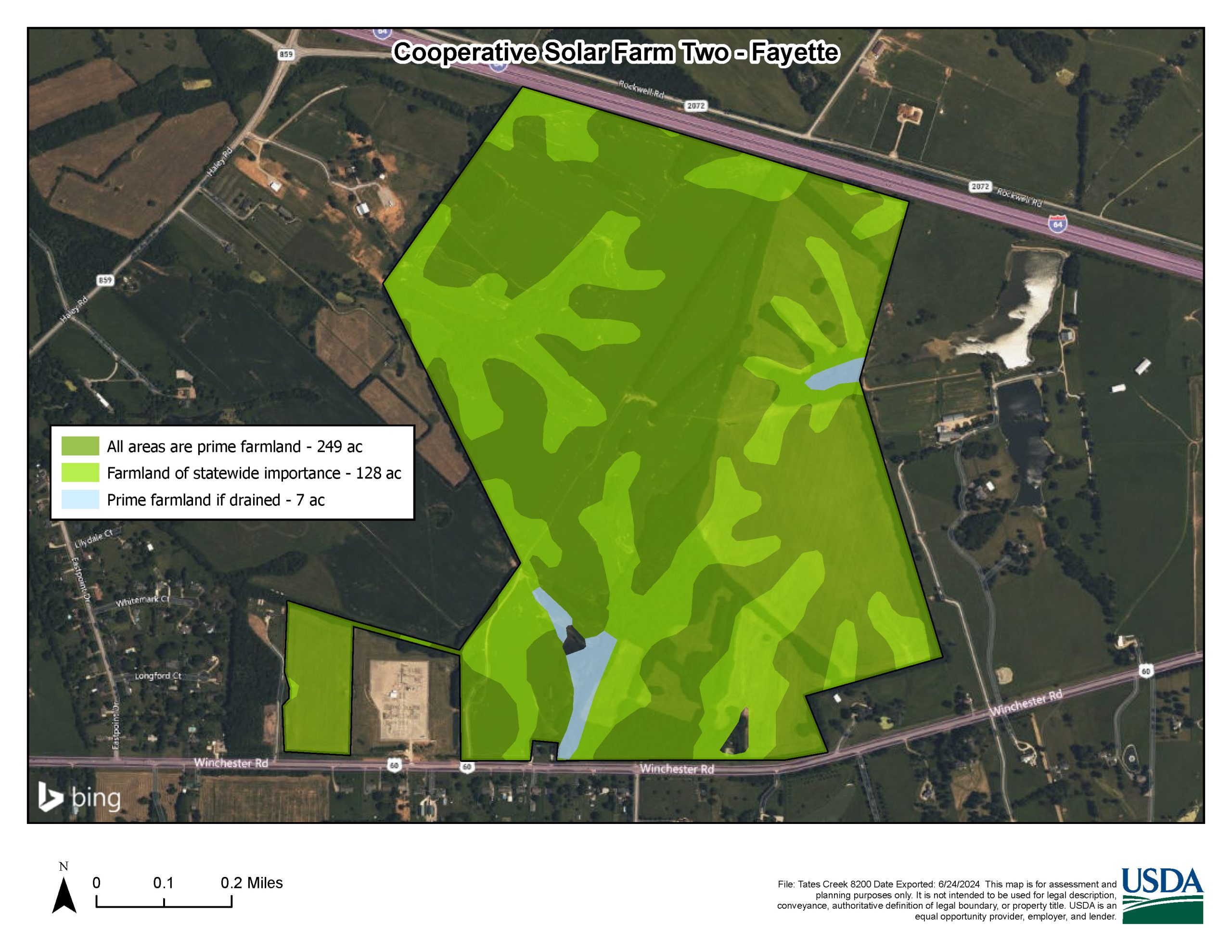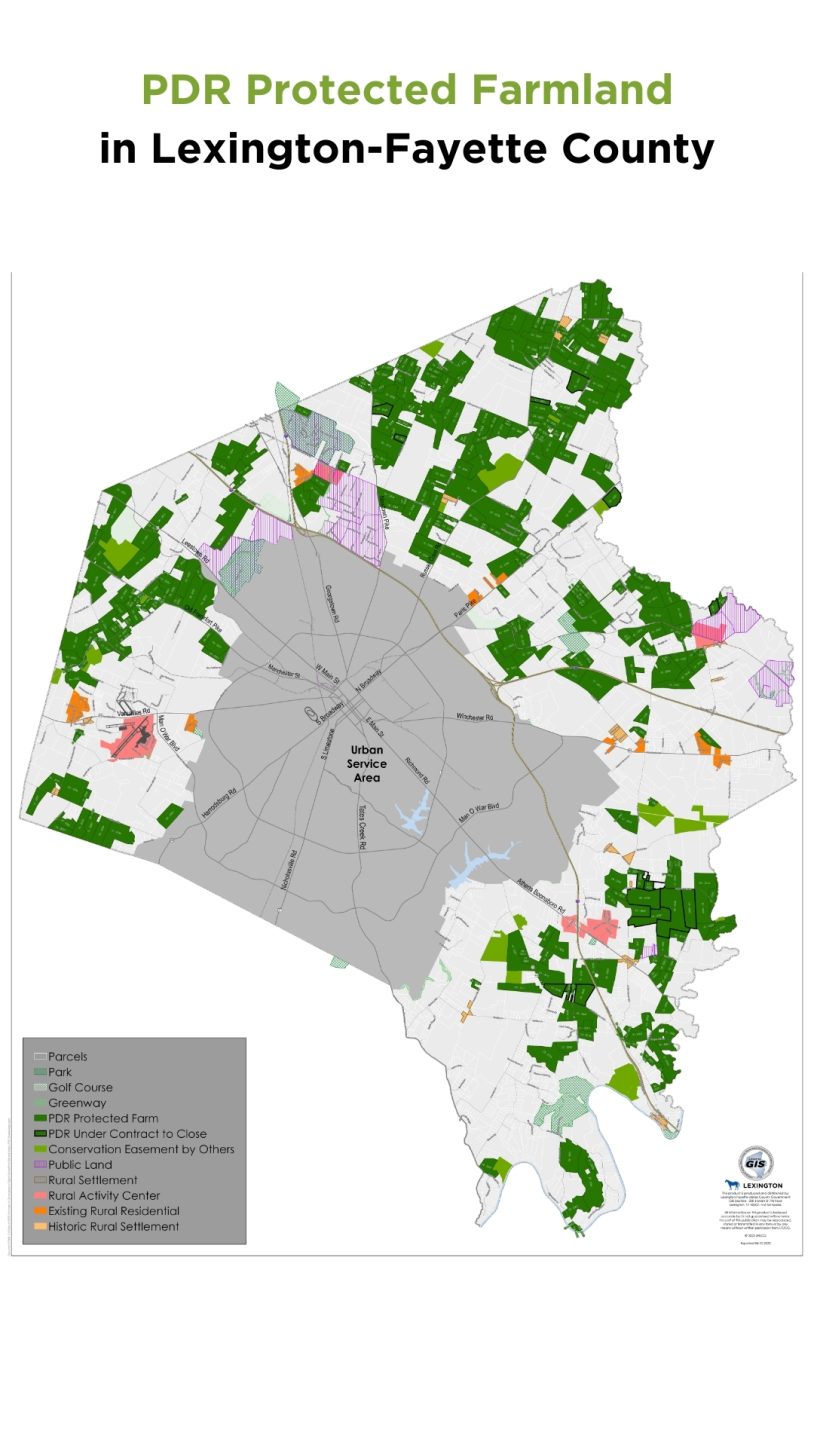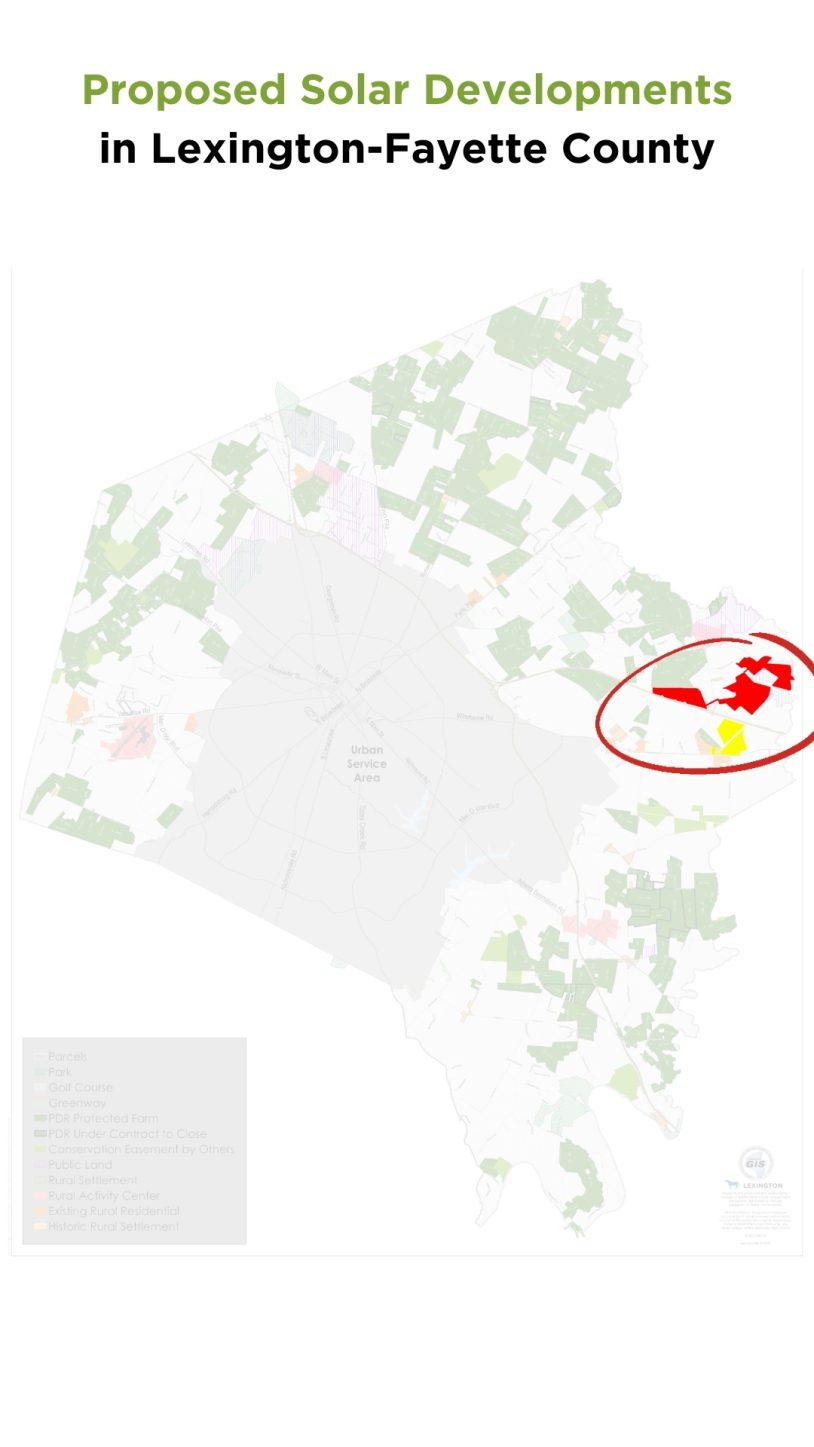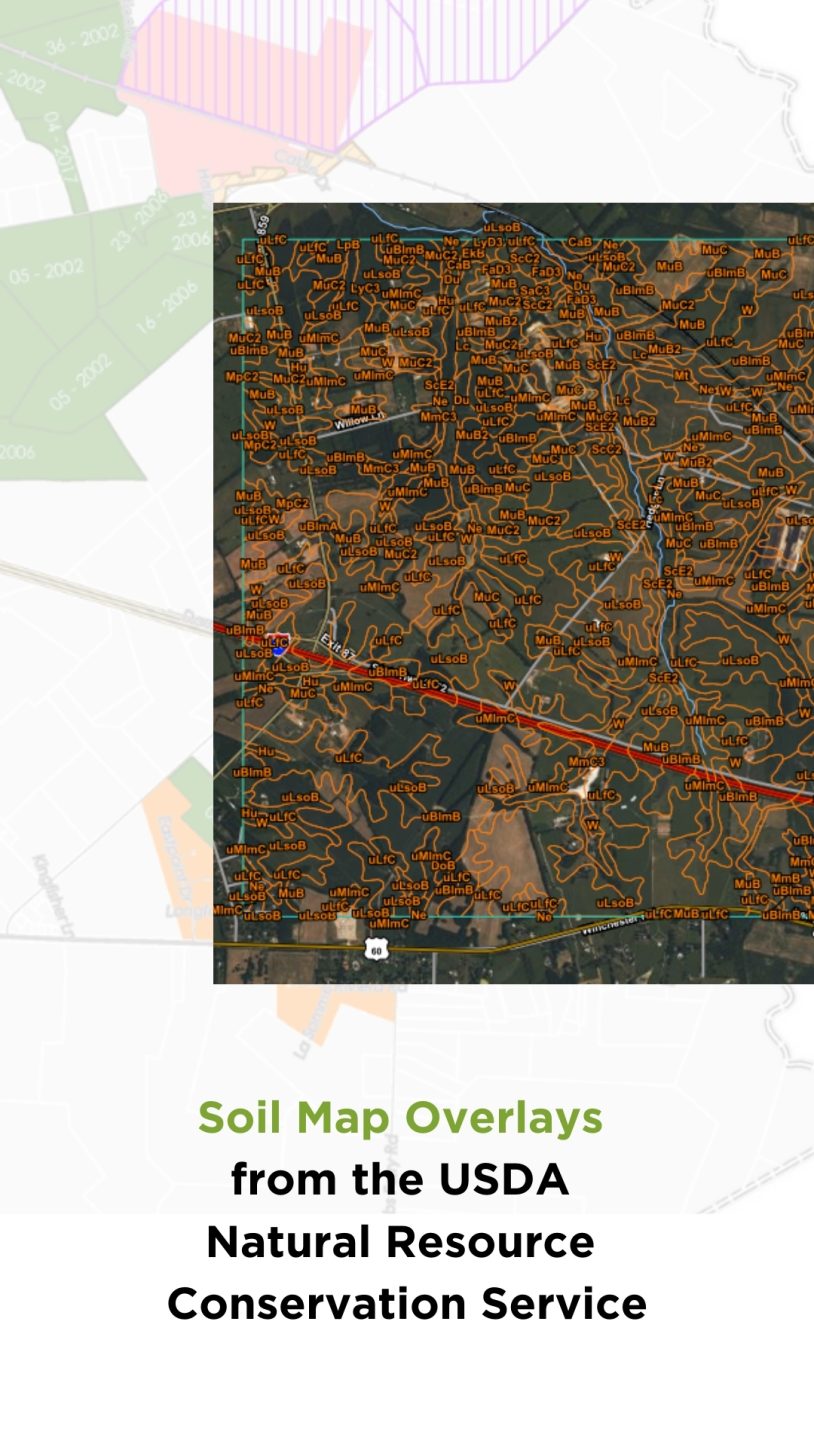Industrial Solar in Lexington, Kentucky
Two different utility-scale, ground-mounted solar projects have recently been proposed for development within the Rural Service Area of Lexington-Fayette County.
- Details: Combined, these two proposals amount to over 1,000 acres of nationally recognized Prime Farmland for solar development, located in eastern Fayette County along the I-64 and Winchester Rd. corridors.
Position Statement
Read Our Solar Energy Systems Position Statement
Here’s What We Think
Fayette Alliance is supportive of renewable energy development, particularly solar on rooftops, brownfield sites, industrial areas, and already built environments.
- However: We have serious concerns about the impacts of locating large-scale solar facilities on Lexington-Fayette County’s world-renowned soils. In addition to the environmental impacts and the loss of prime, nationally significant farmland, we are concerned about the precedent set by permitting these types of commercial and industrial uses in our agricultural zones.
Large-scale solar development is a complex land-use issue that must be thoughtfully addressed and informed by research and analysis.
- Important: It’s critical that our community efforts for sustainability don’t come at the expense of the land that makes Lexington so unique.
Proposal No. 1: Silicon Ranch
Silicon Ranch, a Nashville-based and privately-owned solar company, has proposed a Zoning Ordinance Text Amendment (ZOTA) that permits different scales of solar development throughout Lexington-Fayette County, including in the Agricultural-Rural zone.
- Details: The ZOTA was proposed to accommodate an approximately 800-acre solar farm off Haley Road in the Agricultural-Rural zone, made up of multiple tracts of land.
- Need-to-know: This ZOTA change would apply county-wide, allowing for more developments of this type in the Agricultural-Rural zone.
- Fact: In 2018, Shell became the largest shareholder in Silicon Ranch.
Updates
On Thursday, September 26, 2024, he Lexington-Fayette County Planning Commission voted unanimously not to approve the ZOTA proposed by Nashville-based solar development company Silicon Ranch.
The Planning Commission voted to adopt the regulations for industrial-scale solar proposed by the Planning Staff, which prohibits industrial-scale solar developments in Agricultural zones.
- Dig deeper: The regulations written by planning staff encourage solar energy systems in appropriate zones throughout our community. In addition, they allows for rooftop and integrated solar in our agricultural areas.
Public Input
Now that both Planning Staff and the Planning Commission have now recommended against this proposed ZOTA, the decision to allow industrial-scale solar developments moves on to Council.
- Important: A date for Council to vote on this ZOTA is still to be determined, and we will keep you notified when a date is set.
Click on the image below to read the language proposed for regulating solar energy systems in Lexington-Fayette County by both Planning Staff and the Planning Commission. ⬇️

Read the Lexington-Herald Leader’s Solar Article on Silicon Ranch
View Silicon Ranch Project Photos
Proposal No. 2: East Kentucky Power Cooperative
East Kentucky Power Cooperative (EKPC) has proposed a 387-acre utility-scale solar development in the Agricultural-Rural zone on Winchester Road.
- Details: This project is not governed by local planning and zoning.
- Important: It does not require approval by the Planning Commission or Urban County Council. Instead, it is only subject to the Kentucky Public Service Commission application process and requirements.
- Dig Deeper: EKPC is a not-for-profit utility company headquartered in Winchester, KY. It is owned and governed by 16 electricity distribution co-ops, which is why it is not governed locally.
Only 2% of EKPC’s service area includes Fayette County residents, and the other 98% of EKPC’s customers are outside of Fayette County.
Further, EKPC’s filing documents with the Public Service Commission estimated that 2-3 full-time jobs will be created by this facility over the course of the 40-year life span of the project, but those jobs will be split between the Fayette County facility and the Marion County facility also being proposed.
Prime Farmland and Industrial Solar
Recently, on September 26, 2024, the Lexington-Fayette County Planning Commission unanimously recommended prohibiting utility-scale solar development in our agricultural zones within our local planning and zoning policies.
- Because the majority of our rural area is made up of prime soils — the best for growing food and fiber in the country — and because our Comprehensive Plan prioritizes protecting our rural land and the billion-dollar economic impact of agriculture on our local economy, policies that would permit utility-scale solar development in our rural area are inappropriate.
- Need to know: The land proposed for utility-scale solar development by EKPC is 98% prime farmland or soils of statewide significance.
Soil Study: East Kentucky Power Cooperative
Public Input
A public hearing for this proposed solar development is scheduled for Tuesday, October 29 at 9 a.m. at the Public Service Commission Office in the Richard Raff Hearing Room, 211 Sower Boulevard, Frankfort, KY 40601.
- Important: Fayette Alliance believes digital submission for public input will be the most effective for this industrial solar decision.
Please utilize one of the following options listed below to submit your public comment to the Public Service Commission.
Option 1: Click the button below to submit your comment through the Public Service Commission’s website.
Option 2: Write an Email
- Email: psc.comment@ky.gov
- In the subject line of your email, include the case number — No. 2024-000129.
- In the body of your email, include the case number, your full name, phone number, and address.
Read the Full Project Proposal
Read the Lexington-Herald Leader’s Article on EKPC
Public Comment
Your voice on the important topic of industrial solar in our agricultural areas is critical to the future of Lexington-Fayette County. We encourage you to contact the appropriate entities and express your concerns in your own words.
About the Soil
- Soil Map provided by USDA
- Soil Map provided by USDA
The United States Department of Agriculture defines “Prime Farmland” as such:
“Land that has the best combination of physical and chemical characteristics for producing food. It has the combination of soil properties, growing season, and moisture supply needed to produce sustained high yields of crops economically if it is treated and managed according to acceptable farming methods.”
Using the USDA’s Web Soil Survey map, we attempted to determine approximately how much of the land proposed for solar development was categorized as “Prime Farmland.”
Process
- We took a map of Lexington-Fayette County’s PDR-protected farms.
- We overlaid maps of the proposed solar development sites.
- We then used those maps to identify the soil quality of the proposed areas.
By our calculations, approximately 98.06% of the soil proposed for solar farming is considered “Prime Farmland” or of “statewide significance” by the United States Department of Agriculture.
- Need-to-know: None of the proposed acreage is used for equine operations.
- Consider: The soil that’s at risk is rich, fertile, and irreplaceable; capable of producing food for generations to come.
Full Details
We compiled our research and other soil-related information into short, easy-to-read PDF packets — one each for the proposed industrial solar projects. The studies include:
- maps of the proposed solar sites
- soil maps of the land proposed for development
- breakdowns of the soil types, including acreage and classification
- and more.
Click the buttons below to explore each soil study in detail.
Soil Study: East Kentucky Power Cooperative
Solar Spotlight
- Lexington, KY | The Locust Trace Agri-science Campus is a public school in Lexington-Fayette County specializing in the education of Agriculture Engineering, Animal Science, Equine Studies, Food Science, and Pre-Veterinary Studies. The 70,000-sqft. campus was designed to produce more energy than it consumes annually, making it a net-zero school within the Fayette County Public School system.
- Denver, CO | The Denver Public School (DPS) system is committed to reducing its overall greenhouse gas emissions by at least 90% of the emissions that existed in 2010 by 2050. DPS even has its own Sustainability Department to help achieve this goal. Solar panels have been installed on the rooftops of various DPS buildings throughout the city, and solar carports have been installed in parking lots. The carport panels were constructed in partnership with the City and County of Denver and will provide bill credits to DPS families who need relief on their energy bills.
- Arizona State University | ASU’s comprehensive solar program produces over 53MWdc of energy — enough to power approximately 30,000 single-family homes. The university utilizes both on-site and off-site solar installations to generate this energy. The on-site component of its solar initiative extends to four different campuses and the ASU Research Park, totaling approximately 80,000 solar panels.
- Rutgers University | Rutgers University has installed solar panels in 16 different parking lots across its facilities. These multifunctional installments generate approximately 3% of the university’s total energy consumption, and also provide much-needed shade to faculty, staff, and students in the summer months. Clemson University and Michigan State University have begun construction of similar projects on their campuses. complete a similar project on its campus.
- Santa Cruz, CA | This California city incentivizes its commercial businesses to invest in solar through rebates, free energy audits, and a city-wide Green Business Certification program.
- It’s important to note that Lexington incentivizes residential solar investment through its Solarize Lexington program. However, commercial businesses often have more land and square footage to accommodate solar infrastructure.
- San Antonio, TX | Last year, in September of 2023, the city of San Antonio, Texas allocated $30 million to construct solar panels on 42 different city-owned properties. Solar panels will be installed on rooftops, in parking lots, and in city parks to create shade canopies for residents. In total, this project will offset an estimated 11% of the City’s electricity consumption from its buildings.
- Ubiquitous Energy | This US-based company has invented a thin coating that turns windows into transparent solar panels. The company estimated that utilizing this new coating would be able to provide approximately 30% of a building’s energy needs.
- The Netherlands | In 2018, the Netherlands built solar bike paths spanning 1,000 square meters. These are not simply bike paths with solar panels placed alongside, rather, the paths themselves contain solar cells that are protected by a multilayer of resin, and the electrical architecture has been designed to reduce the amount of wiring.
- Belgium | A two-mile-long rail tunnel has been outfitted with 16,000 solar panels in Belgium, providing enough energy to power all of the trains in the country for one full day.
- India | The Cochin International Airport in India is the world’s first airport fully powered by solar energy, winning the “Champions of the Earth” award instituted by the United Nations in 2018. To achieve this, the airport utilizes 46,150 solar panels laid across 45 acres near its cargo complex.
- Indiana | Following suit to India’s airport initiative, however much closer to home, the Evansville, Indiana Regional Airport has installed solar canopies throughout its parking. This solar installment is the Midwest’s largest airport solar canopy, and the second largest in the US. This initiative generates enough energy to offset 50% of the airport’s power.
Press and Media
Forward Kentucky | May 23, 2024
FOX56 | Solar Farm Info Session | July 9, 2024
WEKU | Solar Farm Info Session | July 9, 2024





